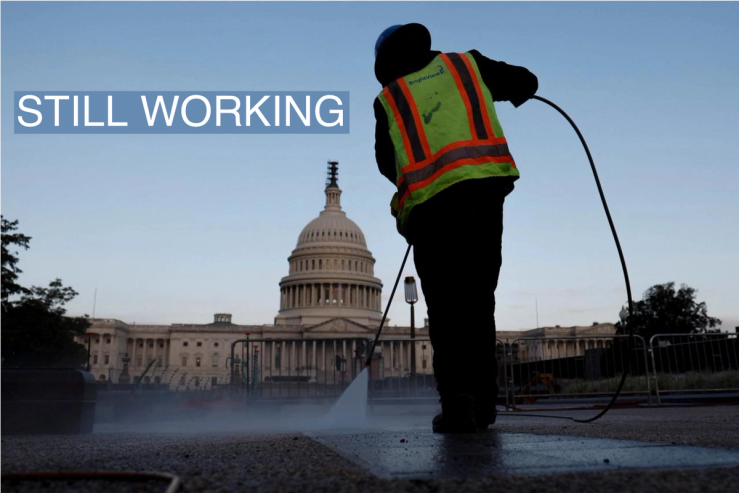The News
Congress is on track to narrowly avert a government shutdown after Speaker Kevin McCarthy surprisingly bucked his party’s right flank to pass a short term funding bill with one day to spare.
The House approved a stopgap measure aimed at funding the government at current levels through mid-November in a robustly bipartisan 335-91 vote. It also included FAA reauthorization, federal disaster relief and an extension of federal flood insurance. The Senate approved it in an 88-9 vote hours later.
McCarthy touted the measure as a victory, and brushed off threats from conservative hardliners to oust him from the speakership for relying on Democratic support to pass it.
“It’s alright if Republicans and Democrats join together,” McCarthy said at a press conference. “If someone wants to make a motion against me, bring it. There has to be an adult in the room.”
Only a day earlier, House GOP leaders failed to muster enough support for a party-line stopgap measure, and 21 Republicans joined House Democrats to sink it. Leadership reportedly told the conference this morning that there were not 218 Republican votes for any of several plans to fund the government, which left them with little choice but to put forward a bill that could attract bipartisan support or risk taking the blame for a shutdown.
The legislation did not include additional aid for Ukraine favored by many in both parties, nor stiff border restrictions championed by House conservatives. It also dropped steep spending cuts to safety-net programs included in earlier House Republican bills.
Know More
As lawmakers went to Capitol Hill on Saturday, it appeared likely that the government was going to shut down as short-term spending proposals from House GOP leaders crashed into fierce resistance from a small band of conservative Republicans.
House GOP lawmakers gathered for a Saturday morning conference meeting to forge a path ahead, and many were resigned to the government’s lights shutting off starting 12:01 a.m. Sunday.
“I don’t think anybody thought we were going to fund the government today at 10 a.m. this morning,” a senior House GOP aide told Semafor. “There was no plan.”
There was little optimism on the Senate side that they could provide them with a way out, either. Sen. Kevin Cramer, R-N.D. predicted Thursday that even a “best case scenario” would require a brief shutdown while House Republicans worked through seemingly intractable divisions.
But in a shock reversal, McCarthy put forward a so-called “clean” stopgap funding measure after previously laboring to appease Republicans on the right, some of whom had previously opposed his speakership and even suggested they might seek to end it now the current funding conflict.
It wasn’t without some unexpected drama. Rep. Jamaal Bowman, D-NY., came under investigation after pulling a fire alarm in the run-up to the House vote at a moment when Democrats were scrambling to delay its passage to give the Senate time to act on a rival bill. The Congressman suggested it was unintentional, but now faces an investigation and calls from some Republicans for his expulsion.
In the end, every House Democrat but one sided with McCarthy in passing the short-term budget while 90 Republicans voted against it. Still, the majority of Republicans voted “yes,” meaning McCarthy didn’t violate an informal GOP prohibition on leaders bringing up bills without most of the conference’s support. That could bolster his hand against any attempt by antagonists like Rep. Matt Gaetz, R-Fla. to oust him.
“We’re on the path to avoiding an extreme MAGA Republican shutdown,” House Minority Leader Hakeem Jeffries said. “It was a victory for the American people and a complete and total surrender by right-wing extremists who throughout the year have tried to hijack the Congress.”
While the vote buys Congress some more time, it still only covers 47 days of funding. Ukraine aid, which Democratic and Republican leaders in the Senate fiercely support, remains in limbo amid fierce conservative opposition in the House.
“We have to persuade our Republican colleagues we are getting to zero hour,” Sen. Chris Murphy, D-Conn. told Axios.
Many senators were concerned about leaving the issue unresolved, especially after a visit from Ukrainian leader Volodymyr Zelenskyy just this month to appeal for help as the country’s forces struggle to regain territory captured by Russia. Sen. Michael Bennet, D-Colo. briefly threatened to hold up the final vote over the lack of Ukraine funding, but withdrew his objection when Senate leadership agreed to give some public assurance they would prioritize passing the spending separately.
Sen. Rick Scott, R-Fla., who consulted with House conservatives throughout the process, told reporters that the Ukraine conversation ultimately had to be separated from must-pass domestic priorities, like disaster relief for his state after Hurricane Idalia.
“We should be taking care of people in Florida and around the country before we do Ukraine aid,” Scott said.
Kadia Goba contributed to this story.

